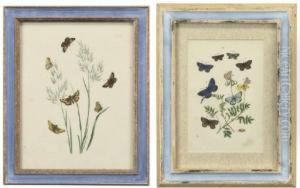John Obadiah Westwood Paintings
John Obadiah Westwood was an English entomologist and archaeologist, who was born on December 22, 1805, in Sheffield, England. Although widely recognized for his work in the field of entomology, he was not formally trained in sciences but rather had a background in law. Despite this, Westwood's passion and self-taught expertise in natural history, especially insects, earned him a significant place in the scientific community of his time.
Westwood's interest in insects began at a young age, and over time, he amassed an impressive collection of specimens. He was particularly fascinated by beetles and butterflies. His meticulous work and scholarly approach to the study of insects led to his appointment as the first Hope Professor of Zoology at Oxford University in 1861, a position he held until his death. The Hope Professorship was associated with the Hope Entomological Collections, which became part of the Oxford University Museum of Natural History.
Throughout his career, Westwood authored numerous papers and books on insects, including his well-known 'Introduction to the Modern Classification of Insects,' which was published in two volumes between 1839 and 1840. This work was influential in the development of entomology as a scientific discipline. He was also a co-founder and active member of the Entomological Society of London and contributed to the founding of the Royal Entomological Society.
In addition to his entomological pursuits, Westwood had a keen interest in archaeology and ancient scripts. He was involved in the decipherment of the Cypriot syllabary, and his work in this area further demonstrated his versatility and intellectual curiosity.
John Obadiah Westwood's contributions to entomology were highly regarded by his contemporaries, and his legacy continues to be acknowledged by entomologists and natural historians. He passed away on January 2, 1893, leaving behind a rich body of work that reflects his lifelong dedication to the study of the natural world.
